Similar titles: The Moving Image
-
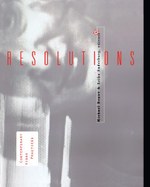 Resolutions
Contemporary Video Practices
Michael Renov and Erika Suderburg, Editors
1995 Fall
Resolutions
Contemporary Video Practices
Michael Renov and Erika Suderburg, Editors
1995 Fall
- Explores the state of the art, practice, and theory of video.
-
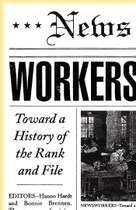 Newsworkers
Toward a History of the Rank and File
Hanno Hardt and Bonnie Brennen, Editors
1995 Fall
Newsworkers
Toward a History of the Rank and File
Hanno Hardt and Bonnie Brennen, Editors
1995 Fall
- The first examination of the role of the laborer in media history.
-
 The Art of the Motor
Paul Virilio
1995 Fall
The Art of the Motor
Paul Virilio
1995 Fall
- A major new work-and a best-seller in France-by one of the most exciting figures in contemporary French thought, this book asks how technology has changed the way we understand the world.
-
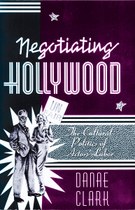 Negotiating Hollywood
The Cultural Politics of Actors’ Labor
Danae Clark
1995 Spring
Negotiating Hollywood
The Cultural Politics of Actors’ Labor
Danae Clark
1995 Spring
- Actors' screen images have too often stolen the focus of attention from their behind the scenes working conditions. In Negotiating Hollywood, Danae Clark begins to fill this gap in film history by providing a rich historical account of actors' labor struggles in 1930s Hollywood. Taking the formation of the Screen Actors Guild in 1933 as its investigative centerpiece, Negotiating Hollywood examines the ways in which actors' contracts, studio labor policies and public relations efforts, films, fan magazines, and other documents were all involved in actors' struggles to assert their labor power and define their own images. Clark supplies information not only on stars, but on screen extras, whose role in the Hollywood film industry has remained hitherto undocumented.
-
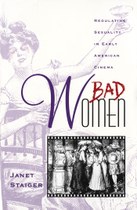 Bad Women
Regulating Sexuality in Early American Cinema
Janet Staiger
1995 Fall
Bad Women
Regulating Sexuality in Early American Cinema
Janet Staiger
1995 Fall
- Charts the cultural tensions played out on-screen in early American cinema.
-
 The Ethics of Marginality
A New Approach to Gay Studies
John Champagne
1995 Spring
The Ethics of Marginality
A New Approach to Gay Studies
John Champagne
1995 Spring
- An original and timely critique which moves gay studies beyond both identity politics and the “rights” discourse, as it questions whose interests are served in an uncritical celebration of the Other. Champagne analyzes a number of recent films, including Paris is Burning, Urinal, and Marlon Riggs' 1989 video Tongues Untied, along with gay pornography. He uses the work of such critics as Jacques Derrida, Michel Foucault, and Gayatri Spivak, as he establishes a ground-breaking and controversial new theoretical model for studies of the Other.
-
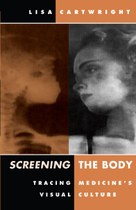 Screening the Body
Tracing Medicine’s Visual Culture
Lisa Cartwright
1995 Spring
Screening the Body
Tracing Medicine’s Visual Culture
Lisa Cartwright
1995 Spring
- Traces the fascinating history of scientific film during the late nineteenth and early twentieth centuries and shows that early experiments with cinema are important precedents of contemporary medical techniques such as ultrasound. Lisa Cartwright brings to light eccentric projects in the history of science and medicine, such as Thomas Edison's sensational attempt to image the brain with X rays before a public audience, and the efforts of doctors to use the motion picture camera to capture movements of the body, from the virtually imperceptible flow of blood to epileptic seizures.
-
 Queer Noises
Male and Female Homosexuality in Twentieth-Century Music
John Gill
1995 Spring
Queer Noises
Male and Female Homosexuality in Twentieth-Century Music
John Gill
1995 Spring
- This fascinating account of gays and lesbians in the music industry considers the lives of a host of performers-from Benjamin Britten and John Cage to Bessie Smith and Janis Joplin, from Billy Strayhorn and Cecil Taylor to Sun Ra and the Pet Shop Boys. Witty, opinionated, and occasionally outrageous, Gill attempts to end the silence about the contributions of gays and lesbians to twentieth-century music.
-
 Television, Tabloids, and Tears
Fassbinder and Popular Culture
Jane Shattuc
1994 Fall
Television, Tabloids, and Tears
Fassbinder and Popular Culture
Jane Shattuc
1994 Fall
- The first book to discuss Rainer Werner Fassbinder in the context of West German television and popular culture.
-
 Narrative Mortality
Death, Closure, and New Wave Cinemas
Catherine Russell
1994 Fall
Narrative Mortality
Death, Closure, and New Wave Cinemas
Catherine Russell
1994 Fall
- Analyzes New Wave cinema from a postmodern perspective.
-
 Syncope
The Philosophy of Rapture
Catherine Clement
1994 Fall
Syncope
The Philosophy of Rapture
Catherine Clement
1994 Fall
- Clément takes us whirling through the timelessness of syncope, the stop-time of music, literature, psychoanalysis, and philosophy. Examining moments of “syncopation” in the discourses of Plato, Descartes, Pascal, Hegel, and Kierkegaard, the author critiques a classical Western logocentric philosophy that always tries to master any fissure of uncertainty.
-
 Film, Politics, and Gramsci
Marcia Landy
1994 Fall
Film, Politics, and Gramsci
Marcia Landy
1994 Fall
- Studies history as a form of folklore and reveals Gramsci's contributions to a rethinking of Marxism.
-
 Unstable Frontiers
Technomedicine and the Cultural Politics of “Curing” AIDS
John Nguyet Erni
1994 Fall
Unstable Frontiers
Technomedicine and the Cultural Politics of “Curing” AIDS
John Nguyet Erni
1994 Fall
- John Erni gives a hopeful view of how we might challenge the way scientists, healers, and the mass media look at the task of treating AIDS.
-
 Small Media Big Revolution
Communication, Culture and the Iranian Revolution
Annabelle Sreberny-Mohammadi and Ali Mohammadi
1994 Fall
Small Media Big Revolution
Communication, Culture and the Iranian Revolution
Annabelle Sreberny-Mohammadi and Ali Mohammadi
1994 Fall
- Reveals how small media (leaflets and audio cassettes) played an important role in the revolution that deposed the Shah of Iran.
-
 Monitored Peril
Asian Americans and the Politics of TV Representation
Darrell Y. Hamamoto
1994 Fall
Monitored Peril
Asian Americans and the Politics of TV Representation
Darrell Y. Hamamoto
1994 Fall
- The first major study of Asian American representation on U.S. television.